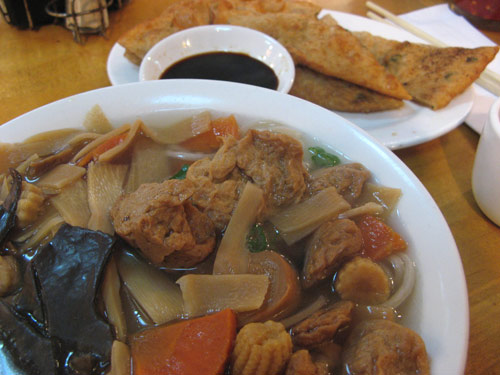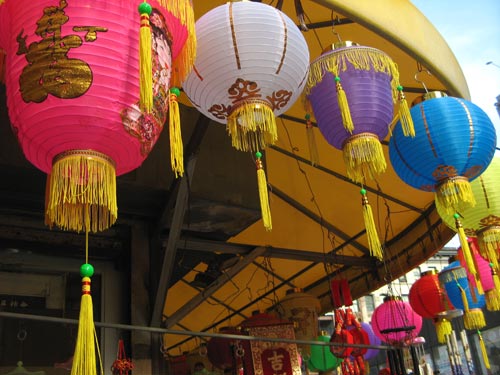Tag: Marco Polo
Stuff Korean people like
For lunch at Marco Polo Noodle Shop this afternoon, I ordered the Buddha’s Delight. (Somehow, it seems we’ve become regulars at this restaurant on Baxter.) The version served here is very different from the dish at Amazing 66 — less a stew than a thrown together assortment of sliced vegetables and canned items over fresh noodles: bamboo shoots, baby corn and fried gluten, sometimes seen in Asian markets as “vegetarian duck,” “vegetarian chicken” or seitan.

SYB, of course, ordered his usual: Noodles with Peking Sauce. During the post-lunch chat with our waiter, it came up that this Northern Chinese dish is a favorite among Koreans for its similarity to “Ja Jyang Myeon.” That Korean dish derives its name from the phonetic translation of the Chinese “Zha Jiang Mian” (literally, “fried sauce noodles”). The Korean version of Peking Noodles is darker, pastier, more vinegary, and according to my friend, made with shredded zucchini.
In Korea, Ja Jang Myeon is traditionally eaten on “Black Day.” On April 14, one of a whole slew of love-related 14th day celebrations, those without significant others gather around bowls of comforting dark-sauced noodles to wallow in their singledom… which I suppose makes it the Korean equivalent of Ben & Jerry’s.
More noodles
After a holiday hiatus, we were back in Chinatown for lunch again on Thursday. I didn’t have a specific destination already in mind, so at my friend’s request, we ended up back at Marco Polo Noodle Shop on Baxter. It’s good, but I’m not sure why he’s so obsessed with this place. It has to be the noodles.
We must be regulars now, because our waiter chose this afternoon to initiate more personal interactions. His very first question to me, head gesturing toward my dining companion: “He’s Korean, right?” Haha. (Yes.)

After lunch, we passed these colorful lucky lanterns, set up for the upcoming Chinese New Year on February 7, 2008. The annual celebrations last 15 days, ending with the Lantern Festival on the first full moon of the new lunar year. The lantern-lighting tradition dates to the Han Dynasty, and though its origins are unclear, the most popular legend surrounding the festivities concerns a town’s deliverance from fiery destruction at the vengeful hands of the Jade Emperor of Heaven.
| S | M | T | W | T | F | S |
|---|---|---|---|---|---|---|
| 1 | 2 | 3 | 4 | 5 | 6 | |
| 7 | 8 | 9 | 10 | 11 | 12 | 13 |
| 14 | 15 | 16 | 17 | 18 | 19 | 20 |
| 21 | 22 | 23 | 24 | 25 | 26 | 27 |
| 28 | 29 | 30 | 31 | |||
Search
Popular Tags
Categories
Archive
- July 2010
- July 2009
- January 2009
- November 2008
- September 2008
- August 2008
- July 2008
- June 2008
- May 2008
- April 2008
- March 2008
- February 2008
- January 2008
- December 2007
- November 2007
- October 2007
- September 2007
- August 2007
- July 2007
- June 2007
- May 2007
- April 2007
- March 2007
- February 2007
- January 2007
- December 2006
- November 2006
- October 2006
- September 2006
- August 2006
- July 2006
- June 2006